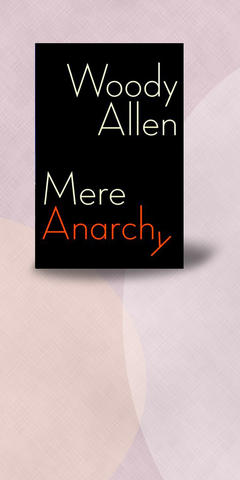As a filmmaker, Woody Allen just about hangs on to his status as the arch-comic spirit of his age, despite a welter of poor films. It would be as easy to program a week of his clunkers as one of near-classics (a distinction, admittedly, that he shares with Robert Altman). On the page, to judge by this collection of humorous writing, it's a different story - he's just another arch comic.
Is there a more depressing category than "humor"? I tried to be fair to this book by not reading the pieces back to back. Such skits and squibs function in a magazine (about half of these were first printed in the New Yorker) as light relief, palate-cleansers in prose. Putting them together in a volume is a severe test of the feuilletoniste, which only the most talented can hope to survive (among them Flann O'Brien, Paul Jennings and Michael Frayn). Even in the smallest doses, these lazy riffs and lame parodies do more to annoy than entertain.
Since at least the Victorians, writers have announced their intention to amuse with a facetious linguistic register. Why? I've no idea. Antimacassars are no longer in fashion, whalebone is a rarity, yet the stylistic gurning goes on. "Upon arriving home and perusing in secret her libelous narrative, I was rendered dumb" could as easily be Mr Pooter as Mr Allen. Humorous writing is where discredited words such as "eschew," "distaff," "poltroon" and "matutinal" come to die. It's their final forwarding address.

"Feigning Whipple's disease, I bailed out of my work early, pausing at the corner hops emporium to placate my jangled ganglia and review the crisis." "Apocryphal or not, the mollifying lore of geniuses who temporarily mortgaged their integrity gamboled around my cortex some months ago when the phone rang as I was adrift in my apartment trying to tickle from my muse a worthy theme for that big book I must one day write." The difference between mock-pomposity like this and the real thing is very slight, and actually works in favor of the real thing - mock-pomposity doesn't have the excuse of being unconscious. Pomposity is a venial sin, mock-pomposity is mortal.
Linguistic contortion on this scale precludes any sort of character drawing. Is there any stylistic difference here between the person quoting and the person quoted? "We won't be able to set foot at any of the posh watering holes we habituate without being snickered at and lampooned by wit's cruel rapier. Velveeta refers to you as 'that gnarled little pipsqueak who buys his hapless offspring into top preschools while failing to do yeoman service in the boudoir.'"
That's Velveeta Belknap, by the way. Dear God, the comedy names. Harvey Afflatus, Paula Pessary, Moe Bottomfeeder, Mike Umlaut, E Coli Biggs, Agamemnon Wurst - the best of them sound like something found scrunched up in Groucho Marx's wastepaper basket. Except for Reg Millipede, which sounds like something found scrunched up in Monty Python's wastepaper bin.
Several of these pieces are perfunctory fantasies inspired by items in newspapers, which suggests something like a closed circuit of self-congratulatory whimsy. Read something cute or outlandish in the New York Times, dish it up again for another Manhattan publication, garnished with a few high-art references (such as the title of the book) to lend a little class. Ignore the realities of the original item (a kidnapping in India) to refer to a plane full of Indian beggars returning from a convention - "though I couldn't parse a word of Urdu I was fascinated as they compared afflictions and examined one another's bowls." The only half-way decent piece in the book, The Rejection, a satire about the disastrous effects of a child failing to get into a desirable nursery school done in the style of Dostoevsky, may also have been inspired by something in the papers, but it's just possible that a little life has crept in from somewhere. As if Allen paused in his scavenging for processed news items to reprocess, and got a little imaginatively involved by mistake.
It's been many years since Woody Allen did stand-up comedy, the reason being that he was changing his spots, artistically. He wanted to be taken seriously, spoken of in the same breath as Bergman. And what does he want now? To have his stuff appear in the New Yorker, apparently, for whose pages Bruce McCall and Paul Rudnick produce infinitely more inventive material. The New Yorker may have more prestige, but stand-up is a genuinely testing form. Many of these pieces sound like bad stand-up anyway, like this routine about particle physics from Strung Out: "My grasp of general relativity and quantum mechanics now equals Einstein's - Einstein Moomjy, that is, the rug seller. How could I not have known that there are little things the size of 'Planck [sic] length' in the universe, which are a millionth of a billionth of a billionth of a billionth of a centimeter? Imagine if you dropped one in a dark theater how hard it would be to find. And how does gravity work? And if it were to cease suddenly, would certain restaurants still require a jacket?'
I could go on - he certainly does. Woody Allen should try this material out on a paying audience, to see if he can put it across. If he can, then he's still a formidable performer, but he needs to hire a better writer.

The depressing numbers continue to pile up, like casualty lists after a lost battle. This week, after the government announced the 19th straight month of population decline, the Ministry of the Interior said that Taiwan is expected to lose 6.67 million workers in two waves of retirement over the next 15 years. According to the Ministry of Labor (MOL), Taiwan has a workforce of 11.6 million (as of July). The over-15 population was 20.244 million last year. EARLY RETIREMENT Early retirement is going to make these waves a tsunami. According to the Directorate General of Budget Accounting and Statistics (DGBAS), the

Many will be surprised to discover that the electoral voting numbers in recent elections do not entirely line up with what the actual voting results show. Swing voters decide elections, but in recent elections, the results offer a different and surprisingly consistent message. And there is one overarching theme: a very democratic preference for balance. SOME CAVEATS Putting a number on the number of swing voters is surprisingly slippery. Because swing voters favor different parties depending on the type of election, it is hard to separate die-hard voters leaning towards one party or the other. Complicating matters is that some voters are

Five years ago, on the verge of the first COVID lockdown, I wrote an article asking what seemed to be an extremely niche question: why do some people invert their controls when playing 3D games? A majority of players push down on the controller to make their onscreen character look down, and up to make them look up. But there is a sizable minority who do the opposite, controlling their avatars like a pilot controls a plane, pulling back to go up. For most modern games, this requires going into the settings and reconfiguring the default controls. Why do they

Take one very large shark, a boat (we’re gonna need a bigger one of those) and a movie that ran way over budget and you’ve got all the ingredients of a career-making film for one of Hollywood’s most successful directors. Now fans of Jaws — Steven Spielberg’s terrifying thriller about a man-eating shark — can re-live the movie as it celebrates its 50th anniversary in an exhibition at the Academy Museum in Los Angeles. “The film certainly cost me a pound of flesh, but gave me a ton of career,” Spielberg told reporters as he toured exhibits of props and memorabilia